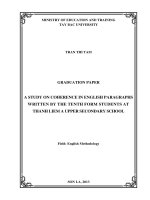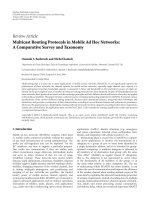Proverb on weather in English
Bạn đang xem bản rút gọn của tài liệu. Xem và tải ngay bản đầy đủ của tài liệu tại đây (122.3 KB, 8 trang )
HANOI OPEN UNIVERSITY
FACULTY OF ENGLISH AND MODERN LANGUAGES
~~~~~~~oOo~~~~~~~
ASSIGNMENT ON English semantic
Topic: Proverb on weather in English
Hanoi, 2009
Website: Email : Tel : 0918.775.368
1
Part A: Introduction
My interest in weather started when I was very young and while it’s
difficult to point to one event or one side of nature that developed my weather
interests. I have many memories of hot summer days, billowing clouds that
developed in the thunderstorms, and brilliant flashes of lightning as big
thunderstorms pounded my neighborhood. All of these things played a part in
my love of weather, but they weren’t the only things. As a child, I found just
as much fascination in reading books about weather. One of my favorite
books, though I don't remember the title, was a book that featured numerous
weather proverbs. It was always fun to read the proverb, and then watch the
skies to see if the weather really changed as the proverb suggested.
Weather proverbs are an ancient part of human society. Some weather
proverbs are quite correct, depending on where on is. When considering
weather proverbs it is important to remember that weather patterns move very
differently in the English. Proverb on weather _ the specific part of each
language, make the language become more vivid and beautiful. They are used
widely nowadays in the daily conversation book, and mass media…
Website: Email : Tel : 0918.775.368
2
Part b: development
I) What is proverb?
Every language has proverbs. Learning and understanding them is an
important aspect of the mastery of language. English language is no exception
as it contains a large number of proverbs which are extensively used
“Proverbs are the wisdom of people”. Many various definitions are mention to
proverbs:
"Proverbs are popular fixed sentences expressing a rule of conduct or
wisdom in a vivid, short form."
(Rohrich-Mieder 1977. page. 2.)
"A proverb is a short sentence of wisdom."
(Quoted by Mieder 1989. p. 15.)
"A proverb is a standard statement of moral and colloquial imperatives
in fixed metaphorical paradigmatic form, it deals with fundamental logical
relationships."
(Barley 1972. page. 741.)
"A proverb is a general statement or judgment, explaining, classifying
or assessing a situation.
"( Harald Burger, quoted by W. Mieder 1977. page. 2.)
"A proverb is a popular set phrase having no author, known mostly in
different languages, expressing in one sentence a principle, advice, a genuine
or assumed truth in a general, concise form, its basic idea being of general
validity, or at least its user considers it as such."
(O. Nagy 1979. p. 645.)
Website: Email : Tel : 0918.775.368
3
II) Proverb with weather in English.
Man's concern with weather has been well documented throughout
history. Humans have sought to understand, predict and control the weather.
Each culture has sought to understand weather through stories that explain
how the Sun was created, how and why the wind blows, why we have frost
and how fire came to the world.
This concept is reflected in the English proverb:
"Red sky at night, sailor's delight;
Red sky in morning, sailors take warning."
(Schneider, 1996)
First of all, the proverb refers to night, and morning. In this case night
means sunset, and morning means sunrise. Because of the way our
atmosphere filters sunlight, you generally won't see red skies during the
middle of the day. However, when the sun is low in the sky, such as at sunrise
and sunset, light from the sun gets filtered by our atmosphere, and the shorter
wavelengths of blue and green get scattered more easily The longer
wavelengths of red and orange are then allowed to pass through the
atmosphere where they highlight clouds and the sky on the horizon near
sunrise and sunset. That tells us two important things. First, there are no
clouds on the distant horizon to block the sun’s light, and secondly, there are
no storms between us and the setting sun, so quiet weather will likely
continue through the night and into the next day, if not longer. Therefore, any
clouds reflecting the orange and red rays of the setting sun are producing a
pretty scene, but typically nothing more…and so we have, “Sailors Delight”.
The saying “clear moon, frost soon” is applicable to all regions of the
Earth, because when the sky is clear, there is no insulating cloud cover to
prevent frost, so during the winter, a clear moon can be a strong indicator of
frost. “Halo around the moon, rain or snow soon” is a bit less reliable; the
Website: Email : Tel : 0918.775.368
4
halo is caused by crystals in the sky, which may or may not develop into wet
weather. You may also have heard weather proverbs about stars huddling
together before poor weather; these proverbs reference the fact that when
heavy cloud cover obscures much of the sky, it can look like the visible stars
are clinging to each other.
"A year of snow, a year of plenty"
A continuous covering of snow on farmland and orchards delays the
blossoming of fruit trees until the season of killing frosts is over. It also
prevents the alternate thawing and freezing which destroys wheat and other
winter grains.
"Rainbow in the morning gives you fair warning."
In the morning, when the sun is in the east, the shower and its rainbow
are in the west. As the weather in the mid-latitudes of the northern hemisphere
moves mostly from west to east, the morning rainbow indicates that rain is
moving from the west toward the observer.
Old weather proverbs and saws have their inception in atmospheric
conditions. Properly interpreted, these conditions give accurate information on
what is likely to happen in the next few hours. For instance, a red sky means rain
or dry weather according to the time of the day it occurs. The principle is based
on certain optics and conditions of the atmosphere. Another example: smoke
hovering near the surface of the ground indicates heavy moisture in the air.
When it ascends straight up there is little likelihood of rain.
Among the more reliable weather proverbs are:
_“The moon and the weather may change together,
But a change of the moon, will not change the weather.”
_“A ring around the sun or moon, means rain or snow coming soon”
_“When grass is dry at morning light
Look for rain before the night.”
Website: Email : Tel : 0918.775.368
5









